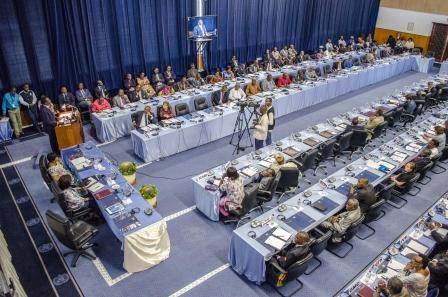Dr Sambo calls for concerted efforts to strengthen human resources capacity to support universal health coverage
 FOURTH REGIONAL CONSULTATION ON HEALTH WORKFORCE
FOURTH REGIONAL CONSULTATION ON HEALTH WORKFORCE
Brazzaville, 2 December 2013 – Health experts are meeting in Brazzaville, Congo to discuss how countries can strengthen human resources capacity to support universal health coverage in the African Region. The three-day event is attended by over 70 participants including Deans of medical, nursing and health sciences training institutions, development partners and professional associations.
Addressing participants at the opening session, the World Health Organization’s Regional Director for Africa, Dr Luis Sambo said: “Universal health coverage aims at ensuring that all people have access to quality health care without experiencing financial hardship. This is where the human resources role is crucial for both coverage and quality care.”
The Regional Director observed that although some countries are making progress, much more needs to be done. At least one million new health workers are urgently needed in the African Region to ensure that qualified health workers are available in the right places to deliver quality health services. In addition to this, countries in the Region are grappling with weak education and training capacity, insufficient financial resources, lack of comprehensive data on health workers and information for decision making, among others.
In response to these challenges, last year, Ministers of Health from the WHO African Region adopted the “Roadmap for scaling up human resources for health for improved health service delivery in the African Region 2012-2025”. The Roadmap recommends priority actions in six key areas including strengthening the capacity of health workforce leadership and governance; strengthening regulatory capacity of human resources for health; scaling up education and training of health workers; optimizing the utilization, retention and performance of the active health workforce; improving health workforce information and evidence for decision-making and strengthening health workforce dialogue and partnerships.
Dr Sambo called on Health ministries to take the lead and strengthen collaboration with other key Ministries such as education, finance, labour and employment, the private sector, universities, professional associations and other health stakeholders to institute appropriate mechanisms in order to optimize synergies and prevent fragmentation. “Such mechanisms should allow the development of common definitions and approaches for policy dialogue and actions”, he added.
It is expected that participants will deliberate on how to implement the framework for the Roadmap and a business plan for Afritex- a regional initiative that seeks to make relevant textbooks, learning materials and diagnostic equipment affordable and accessible to countries.
For more information, please contact:
Dr. Djona Avocksouma, +47-241-39174 ; Email: avocksoumaa [at] afro.who.int (avocksoumaa[at]afro[dot]who[dot]int)
Mr C. Boakye-Agyemang +47-241-39420; E-mail: Boakyec [at] afro.who.int (Boakyec[at]afro[dot]who[dot]int)



